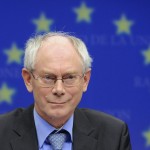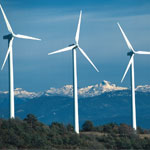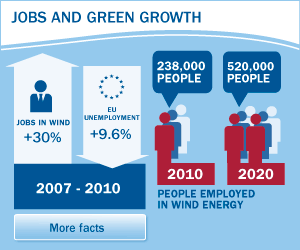
Herman van Rompuy, President of the European Council
The issue of energy may have been overshadowed by that of tax at yesterday’s EU summit of Heads of State in Brussels, but its growing importance and impact on Europe’s economy is one that cannot be ignored.
As the Financial Times reported on Tuesday, Europeans are paying a lot for their energy – prices are 37% higher than those in the US and 20% higher than those in Japan. Why? Largely because we import an incredibly high share of expensive fossil fuels.
What’s worse is that this dependence – and hence impact on prices – is growing. Herman van Rompuy, President of the European Council, has said that by 2035 over 80% of our energy will be imported, posing a threat to Europe’s competitiveness and endangering its economy.

French Environment Minister Delphine Batho
Writing in France’s prestigious centre-left daily newspaper Le Monde, Peter Altmaier, the German environment minister, and Delphine Batho, his French counterpart, underlined the need for a 2030 renewable energy target and highlighed the importance of renewables in transforming the European economy, improving energy security and reducing greenhouse gas emissions.
“We want to make the energy transition [moving to produce a significant amount of electricity from renewables] the new motor of the Franco-German couple,” stated the letter. It noted that the two countries recently decided to create a joint renewable energy office that will focus on promoting cooperation between companies, and on encouraging political and scientific collaboration on renewables.
France is aiming to reduce the share of nuclear in its electricity production from 75% to 50% by 2025, to increase the country’s energy efficiency by around 20%, and by 2020 to produce around 23% of electricity from renewables, according to Ms Batho. Germany, meanwhile, wants by 2022 to no longer produce any energy from nuclear power and by 2030 to produce at least 50% of its electricity from renewables.

An image from the Wake-up Call app
The global temperature is rising. Freak weather events are multiplying. Climate change is happening.
And yet governments are giving $6 to polluting fossil fuels for every $1 dollar that goes to clean renewables.
World leaders must move now to renewable, clean energy sources like wind energy. And with the new Global Wind Day app you can tell them to do it and why.
On 17 and 18 June, leaders of the governments of the world’s eight wealthiest countries are meeting in the UK. The leaders of these countries, such as Barack Obama, Vladimir Putin, Angela Merkel and François Hollande, are ultimately responsible for the continuing and growing support for dirty fossil fuels given by their governments. Such subsidies are up nearly 30% from 2010 to $523bn in 2011 (IEA, 2012) compared to $88bn for renewables.

Ambassador Tom Hanney
Irish Ambassador to the European Union Tom Hanney is in the throes of a six month stint at the heart of decision making in Brussels, as Ireland currently holds the EU Presidency. The Deputy Permanent Representative says holding the Presidency is “a marathon, from January to June”. We met him to find out about Irish commitments to wind energy and why they have given so much support to Global Wind Day this year.
What motivated the Irish Presidency of the EU to support Global Wind Day 2013?
From a national point of view, wind energy is very important to Ireland. In the Irish government’s Renewable Energy Strategy, wind is identified as a key resource.
We have a lot of wind sweeping over the country given our geographical location. An increasing amount of our energy is produced from wind. We are committed to reaching our renewable energy targets under EU energy policy and we will be a net wind exporter. Overall, wind is a very important resource for Ireland and an increasing one, so therefore we support Global Wind Day.
Ireland is not on track for EU emissions targets and the reductions, but is well on track for our 20:20:20 commitment – that 20% of your energy has to be produced from renewable energy sources by 2020. We are at around 18% at the moment.
Do you think the EU needs 2030 renewable energy targets, similar to the 2020 targets?

A new opinion poll conducted in Austria has found that 77% of Austrians are in favour of wind energy compared to just 4% in favour of fossil fuels and 1% for nuclear power.
The poll, published on 8 May by the Austrian Wind Energy Association, IG Windkraft, also found that Austrian’s are prepared to pay €25 per year for wind energy – five times the level they currently pay.
“Austrians want an energy transition and wish for the expansion of wind power,” said Stefan Moidl, Managing Director of IG Windkraft.








 Comments
Comments



